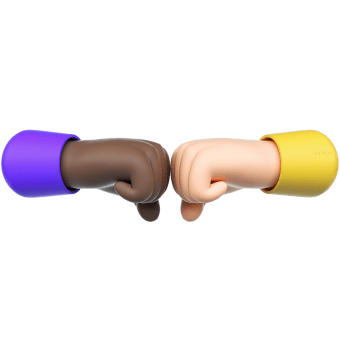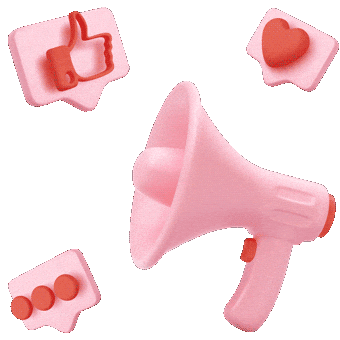Identifying and combating emotional and professional burnout

Found yourself in a desperate need to abstract yourself from everything around you? The word “motivation” seems nothing to you, and a prospect of profit or a meaningful project doesn’t strike a chord in your heart and mind? Seems you are in the middle of emotional burnout. We’ll try to help you.
In this text, we will talk about professional burnout, its symptoms, and how to deal with them. We will tell you what to do if online business—and actually doing something—has taken a great toll on you. We’ll also tell you why most tips from Internet talkers may not be effective, and we will explain why.
Symptoms of emotional burnout
The phenomenon of professional burnout is blanketed by tons of information, and every bit of it is far from being optimistic. For instance, one study showed that 44% of people face this problem from time to time, while 23% of other respondents find themselves exhausted quite often.
It is believed that burnout is a plague among doctors, teachers, and therapists—people whose specialties are associated with close communication and empathy. But this finding does not imply that a silent programmer who spends the best part of work time with their laptop only, is not susceptible to such a condition. Meanwhile, an online businessman is extremely vulnerable to emotional burnout. Sales and marketing are also about interacting with people, most of which can be meticulous, picky, and whimsical.
Those who buy are convinced that the customer is king. They may be right to some extent, but they sometimes go too far in their privileges. Ultimately, these specifics of the marketing and sales industry are what gives birth to stress. And stress is the principal factor that drives—and leads to—emotional burnout.
We don’t have to tell you about repercussions of stress-related conditions: you must know pretty much about them. Those include ever-lasting weakness, zero energy, poor sleep, inadequate appetite (either overeating or malnutrition), apathy, nervousness, anxiety, and feeling a lack of control.
But ordinary stress differs much from severe emotional burnout. When you reach burnout, all the common manifestations of stressfulness get three times stronger. Zero motivation and energy is not when you can barely make yourself do something. It’s when you feel helpless and emasculate, seeing a sign in your mind yelling, “LEAVE ME ALONE.” In fact, your emotions can actually burn out; when they do, devastation and corrosive cynicism take their place—making you unable to feel for what you do.
This is as if you were a chair whose only mission is to hold the person sitting on it. Important stuff, huh? You might get disposed of if the sitter falls down from you. This means you are being pressed by this duty, and this responsibility entails stress. Down the road, you burn out: you start caring about nothing and your mission doesn’t seem important anymore. Legs crack, and you, the chair, fail your mission.
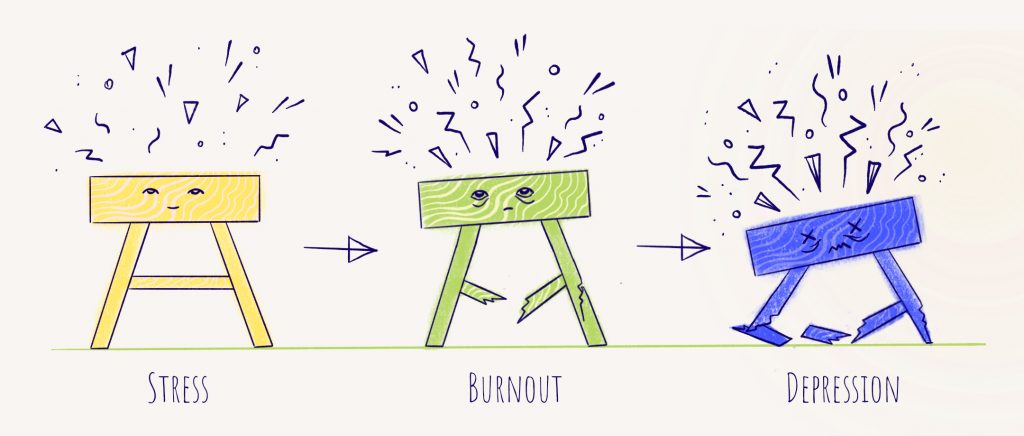
Stress can be overcome without any significant transformations. You can get through the difficulties, psych up, and keep on working. But burnout, stemming from a series of stress situations, is a harder thing that inevitably requires solid steps to prevent growing weaker and save yourself. Apparently, a burnt-out person cannot show the same performance at work.
You can also listen about the impact of burnout and stress in JRNI podcast here.
Do not confuse depression and burnout. Professional emotional burnout mostly pertains to work, while depression spans all the facets of life—presenting an even more acute concern. The worst part is that professional emotional exhaustion may morph into depression.
Preventing emotional burnout
We have already found out that continuous stress at work results in burnout. A number of reasons may stay behind this: day-to-day tension, heavy responsibility burden, task flow, overloading, and fear of losing the job.
This brings us to another point. Burnout can rise from a job that does not show any short-term results. You just work and work, but see no benefits or progress. Long-lasting projects may affect you this way. For example, you have to launch an online store. Day after day, you are communicating with contractors, programmers, designers—coordinating statements, cost sheets, arranging calls, and connecting people.
But since the project is a large-scale initiative, you will reach the result—the operating website—in half a year or even later. In another scenario, you may never attain your goal within this timeframe: who knows how your counterparts will behave. No matter how it goes, you are being nervous and it seems to you that you do what you do, in vain, unable to control the situation. You burn out.
Another factor that can contribute to emotional burnout is routine, tedious job tasks that come and go every day.
What could you do to remedy this? Avoid activities that do not yield any tangible results and not have certain timeframes. If you think you are going to engage in something like that, plan the deadlines, tasks, and goals, and cooldown periods. Don’t be too strict with yourself.
Studies suggest that entrepreneurs are very susceptible to the risk of burnout because they are often amidst uncertainties.
To tackle routine, use automation services and tools. In today’s world, many things do not require manual labor. And almost every tedious task has a dedicated automation solution.
One more Pro Tip. Even the most dependable employees need to know how to and whom to delegate tasks. Realizing that there is someone who can relieve you from some of the burden can be a great aid to your brain.
One study suggests that a significant reason behind burnout among entrepreneurs is the inability to delegate. People found business on their own and it gets too big for them, and eventually break, overwhelmed by the multitude of problems.
Make sure the atmosphere in your collective is friendly and you are not pressed for no reason. You need feedback, too. If you feel short of it, share your opinion with your manager, colleagues, and peers. In fact, lack of substantiated criticism and reaction is not healthy. Gratification—through not material compensation but social “strokes”—is a momentous aspect.
Try to be more easy-going about your job. Dedication is good, but don’t think a small mistake or error would bury all your accomplishments, turn profit into huge debts, or demolish the world around you. Take a vacation and ignore all work-related calls. You will see that a week or two later, the world will be still alive and planet Earth will keep rotating around the Sun.
Work means different to different people. Peter thinks entrepreneurship is a perfect activity for him. He values what he does and centers his life around it, since he thinks there is no such a great self-fulfillment and earning opportunity. Result: Peter suffers from burnout. Sarah loves her business too and is convinced she’s born to do what she does. But unlike Peter, she doesn’t view entrepreneurship as the only career option. And this helps her feel more relaxed. Sarah says she never faced the state of burnout.
If you feel stagnating and useless, this may be a pronounced sign of upcoming burnout. For the purposes of prevention, therapists recommend self-development, courses, reading (helpful things like our blog).
However, there are some factors that we cannot govern. Some people are more resistant to stress; they don’t shiver from seeing the deadline in the schedule and just work. Meanwhile, others eat their heart out so badly that their mental health collapses. Some people are more prone to pessimism or perfectionism, which are also among the risk factors. The only effective way out here is improving yourself: for instance, by means of cognitive-behavioral therapy.
Studies show that entrepreneurs reporting excess passion for their work burn out more often than others. They worry more about the results, and rest less. With that, they distract more often, and it’s harder for them to concentrate.
Smart folks have invented tons of tests that can help identify burnout. We recommend keeping away from self-diagnostics and visit a professional if you want proper analysis. But if you do want to do a quick mental checkup, you can take this.
May we win!
It’s crucial to realize that to extricate yourself from emotional exhaustion, you need to act accordingly to the degree of damage already done to your status.
Psychologist Kristina Maslach argues emotional burnout has several stages. After slight work fatigue and deadened emotionality come uncontrollable irritability and nervousness. Symptoms interlace, accompanied by total weariness. This is already a big concern, but it is followed by a more critical condition: psychosomatics (insomnia, migraine), impaired cognitive functions (memory, concentration), flattened emotions, and feeling that anything you do is nonsense.
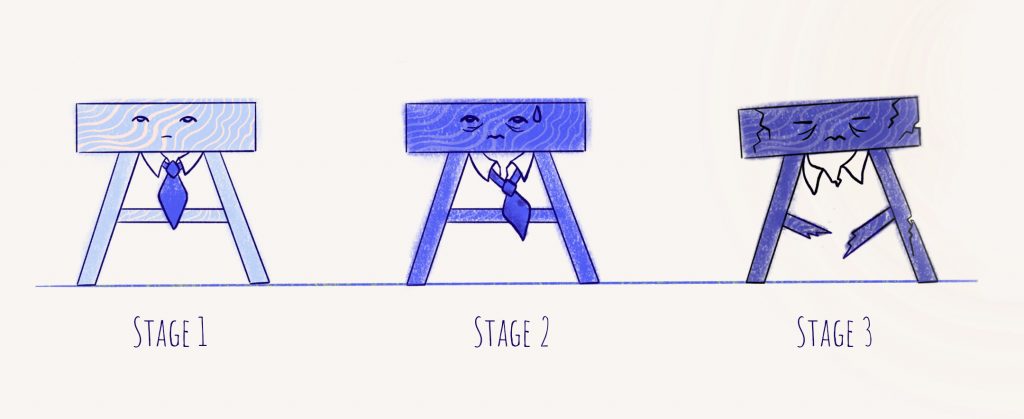
If you did not take any preventive measures and now find yourself at the final stage, ignore articles like, “Feel emotional burnout? Start living a healthier life, rest more, drink more water, talk to the important people and you will cure your exhaustion!” You won’t. These recommendations are nothing but preventive tips. But when you are already at the bay of despair, leisure or one more bottle of water will not make things better.
However, there is a vacation called “sabbatical” that lasts as long as you want it to. You can even leave for a few years. And since a sabbatical implies your title will be still yours when you return, you must feel less stressed out. But here emerges another problem: you realize that, sooner or later, you will have to get back TO THAT WORK. That job, which caused stress and ultimately resulted in burnout.
Let’s solidify. Actual, uncared-for emotional burnout is not just stress. Sports, a healthy diet, or changing the activity won’t do.
The solution is very simple. And very hard. To get rid of stress, get rid of whatever causes it. This would require analysis and since you are not in good shape for effective reflection, your first step is visiting a therapist. A specialist will help you define your stage and tell you what measures are going to be sufficient, what unreasonable, and what untimely. Analyze first, then act.
If, for example, you are an online marketer who handles various business models, discuss your job with your therapist to find out which activity hoovers you.
It may be so that setting up contextual or targeted ads turned into routine—important yet dull. And you are so tired of it that you think of it first in the morning and thus cannot make yourself get up. But at the same time, you may love content projects, composing articles, and SEO-enhancing them.
In such a case, you may not need to quit marketing, but partial refocusing will be crucial. Turn down the model that exhausts you and switch to the other one. You may lose some profit at the beginning, but health costs more.
But if you now hate marketing itself, cannot hear about promoting or selling something, it’s time to leave it.
Let’s get back to the chair example. If some activity has brought you to emotional burnout, compromises will not help.
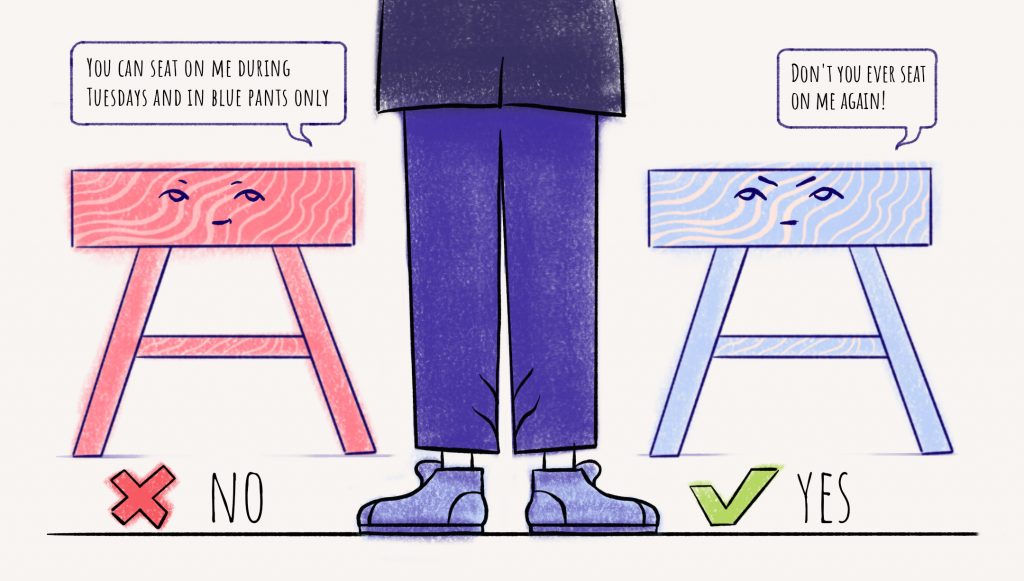
Embarking on something new, keep in mind the measures to prevent emotional burnout. Your fresh start must be informed, with all the above points—obvious but still barely achievable—observed. Self-care, communication with colleagues, continuous development, finding the right time to take a break and relax, ability to delegate and avoid routine and overload—you need all of this.
One more time. If you drown in burnout, treatment in the form of decreasing the load and responsibility and tuning up the life-work balance is not likely to be fruitful. Sleeping more and eating healthy food are also weak tips. You need to play big and leave what led you to such a state.
It is much easier to suppress burnout at earlier stages than cure it. This is true for most conditions. But if your exhaustion is not critical yet, don’t rush to resign: revisit our preventive recommendations.
Enjoy what you do and keep yourself in good health.



